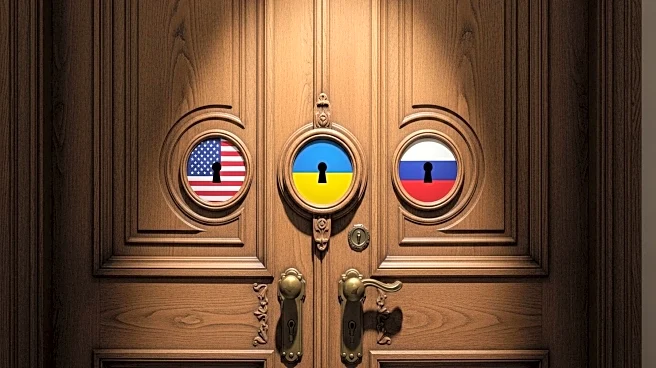What's Happening?
Russian officials have denied the possibility of a bilateral or trilateral meeting involving Ukrainian President Volodymyr Zelensky, Russian President Vladimir Putin, and US President Trump. Russian Presidential Aide Yuriy Ushakov stated there was no agreement for such meetings, contradicting President Trump's earlier statements about planning these diplomatic engagements. The denial comes amid ongoing tensions and military operations in Ukraine, with Putin reiterating demands for Ukraine's full capitulation and regime change. The Kremlin's narrative continues to frame the conflict as a result of Western actions, particularly NATO's expansion, rather than Russia's military aggression.
Why It's Important?
The denial of diplomatic meetings underscores the challenges in achieving a peace settlement in Ukraine. President Trump's efforts to mediate are hindered by Russia's firm stance on its demands, which include Ukraine's neutrality and regime change. This situation impacts international relations and the geopolitical landscape, as the US and its allies seek to support Ukraine while managing tensions with Russia. The ongoing conflict affects global security, economic stability, and humanitarian conditions, with potential repercussions for US foreign policy and defense strategies.
What's Next?
The lack of progress in diplomatic talks suggests continued military operations and geopolitical tensions. The US and its allies may need to reassess their strategies in supporting Ukraine and countering Russian aggression. Potential responses could include increased military aid to Ukraine, further sanctions on Russia, and diplomatic efforts to rally international support. The situation remains fluid, with developments in military operations and international diplomacy likely to influence future actions.
Beyond the Headlines
The conflict in Ukraine raises ethical and legal questions about international intervention, sovereignty, and human rights. The Kremlin's narrative challenges the legitimacy of Ukraine's government, highlighting issues of misinformation and propaganda in modern warfare. Long-term implications include shifts in global alliances, the role of international organizations in conflict resolution, and the impact on civilian populations caught in the crossfire.









